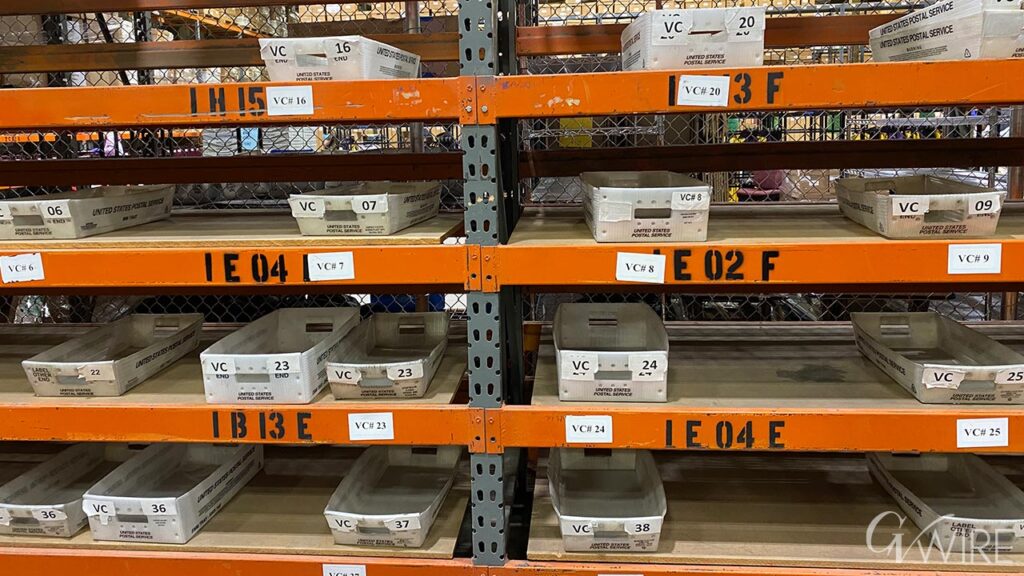California utilities will include a fixed fee in billing starting in 2025. Most Californians won’t see much change or will have a lower bill. (CalMatters/Rahul Lal)

- California regulators allow power providers to impose new monthly fees on customers.
- Utilities must reduce electricity prices, varying from 8% to 18% based on factors.
- Fixed charges are a departure from traditional billing.
Share
|
Getting your Trinity Audio player ready...
|
State utility regulators decided Thursday to let California’s largest power providers stick their customers with a new monthly flat fee in exchange for a reduction in the overall price of electricity, a controversial change to the way that millions of households pay their utility bills with weighty implications for state climate change policy.

Ben Christopher
CalMatters
Under the new policy, utilities will be required to reduce the price households pay for the electricity they use every time they charge a phone or run an air conditioner. That rate cut will vary from 8% to 18%, depending on the utility, season, and time of day, according to the commission’s analysis.
To make up for the lost revenue, regulators have introduced the concept of a “fixed charge,” a break from California electric billing tradition. For decades electric bills from Pacific Gas & Electric, Southern California Edison and San Diego Gas & Electric have been the “pay as you go” variety, with households only paying for the electricity they use.
Starting in late 2025 for SCE and SDG&E customers and in early 2026 for those with PG&E, the state’s investor-owned utilities will be able to charge customers a monthly fee regardless of how much power the customer draws from the grid. So-called fixed charges are a mainstay of electric billing across most of the country, with an average fee of roughly $11.
The new California charge will be $24 for most customers, but lower-income households that already qualify for discounted electric rates will see fees of either $6 or $12.
Related Story: Skyrocketing PG&E Rates Put the Squeeze on EV Owners
Winners and Losers from a Fixed Charge
For households that do not benefit from discounts, lower energy users will pay more every month.
The unanimous vote by the California Public Utilities Commission comes after months of heated debate that pitted Assembly and Senate Democrats and Republicans against legislative leadership and the governor’s office, advocates of rooftop solar against labor unions representing utility workers, and environmental advocates against one another.
Backers of the billing change say it’s a necessary step to bring down electricity rates in California, which are among the highest in the country. California regulators want all new cars sold by 2035 to be electric and are taking steps to discourage gas-powered indoor appliances. Those goals are hard to square with sky-high electric prices.

The state’s planned “transition to all electric homes, cars and trucks is truly transformative,” said CPUC President Alice Reynolds at Thursday’s hearing. Under the proposed change all customers “will be better off financially if they electrify — whether that’s purchasing an electric vehicle or switching out a gas appliance with an electric one.”
Opponents argue that the change in billing policy won’t move the needle for most households considering dumping their gas-powered cars and appliances, which can cost tens of thousands of dollars, but will instead needlessly discourage energy conservation efforts while punishing rooftop solar customers.
The policy is a departure from 50 years of regulatory precedent in California, which is “if you use more you pay more and that encourages conservation,“ said Loretta Lynch, a former CPUC president and critic of what she sees as a “pro-utility” bias on the current body. Reducing the penalty on high energy use will also have “huge cost consequences down the road” for a grid that already struggles to keep up with summer-time demand, she said.
The ultimate impact of the policy change may be more muted than either side wants to admit, said Merideth Fowlie, a UC Berkeley economist and one of a handful of researchers to initially float the idea in 2021 of an income-graduated fixed charge as one way to pay for reduced electricity rates.
The three-tiered CPUC-approved change doesn’t vary much by income and its promised rate reductions are relatively modest, said Fowlie.
“Clearly, I’m disappointed, because I don’t think it comes close to where I think we should be in terms of reductions,” she said. “If this forces another conversation — which is, ‘Why are we paying for wildfire risk mitigation, which is essentially climate change adaptation, or some of these major investments in decarbonisation, on bills?’ — I think that’s an important conversation to have.”
Related Story: It’s the Only Store for Dozens of Miles. PG&E’s Latest Rate Hikes ...
Winner and Losers in New California Utility Fee
Though utilities won’t earn any more revenue or profit as a direct result of the change, there will be winners and losers under the new billing program.
The reduced price of electricity will likely save money for people who use a lot of electricity, such as a large household in an AC-dependent part of the state or the owner of an electric SUV, a heat pump, and an induction stove. That reduction will be more than enough to offset the cost of the new fee. Many, if not most, low-income households who qualify for the discounted fixed charge will also emerge as financial winners.
But there are sure to be plenty of losers, too. Smaller households, Californians living along the temperate coast, energy-conscious customers, and people with solar panels on their rooftops are all more likely to see their total utility bills rise.
That group makes for a powerful political bloc that has fiercely rallied against the regulatory change for months. Many showed up or called in at the commission hearing.
“The big utility tax will increase monthly utility bills on 4 million households while doing nothing to encourage electrification,” said Yvette DeCarlo, speaking on behalf of a coalition of environmental nonprofits, tenant rights groups, liberal advocacy organizations, and anti-tax activists.
Severin Borenstein, another Berkeley economist who co-authored the 2021 study with Fowlie, said modeling suggests that the lower electricity rates under the policy will increase electric vehicle purchases only by roughly 5% above what they would otherwise be.
“It’s in the right direction, though, and I think that we can’t get to where we need to go unless we start,” he said.
The fixed charge policy was included in a budget proposal by Gov. Gavin Newsom’s administration in 2022, but it wasn’t until last year that many state legislators woke up to it. Twenty-one coastal Democrats, led by Thousand Oaks Assemblymember Jacqui Irwin, introduced a bill ordering the CPUC to reverse course. So too did Senate Republican leader Brian Jones. Both efforts were quietly put on ice at the behest of legislative leadership.
In a letter Jones and the rest of the Senate GOP caucus sent to CPUC president Reynolds earlier this week, the San Diego Republican expressed some skepticism that the state regulatory body could be trusted to keep the fixed charge at its current level.
“We are particularly concerned that this will only be the beginning,” the letter said. “The CPUC has been granted unchecked power to increase this new charge at any time. If the $24.15 plan is approved, the next proposal may see the fixed charge hiked to $50, $100, or even higher!”
Related Story: California Regulators OK Change of How Power Bills Are Calculated
More Shade Directed at the Rooftop Solar Industry
For California’s residential solar industry, the vote is just the latest regulatory broadside.
Over the last two years, the CPUC has slashed the payments that utilities are required to give to single family homeowners, apartment buildings, schools, and businesses that install solar panels.
That’s based on the argument, advanced by the commission, the regulated utilities, and many energy economists, that relatively well-to-do solar customers have been overcompensated in California since the early 2000s, which has had the effect of off-loading the costs of running the grid onto non-solar households.
Advocates for the fixed charge say assigning solar customers an unavoidable monthly charge is yet another way to balance out who pays for major utility line items like wildfire prevention, subsidies for low income households, EV charging networks, and distribution system upkeep.
“What the fixed charge does is ensure that we’re no longer going to have freeloaders,” Scott Wetch, a lobbyist who represents many unionized workers employed by California’s for-profit utility companies, told CalMatters earlier this month.
Outraged homeowners with solar panels were well represented among those who called in to give public comment.
“I have solar panels on the home, which we got right away to cooperate with California’s move to have 100% renewable energy. But yet we’re getting hit with this unfair tax,” Joy Frew, a self-described senior citizen from San Diego County, told the commission over the phone.
“People that really invested in solar trying to do the right thing for the planet — all of a sudden we’re being slapped in the face for doing it,” said a caller named Steve Randall from San Clemente.
Not that every Californian with a solar panel above their head is opposed to the fixed charge. Fowlie, one of architects behind the idea, said her family hopped on the solar bandwagon as a way to bring down their monthly utility bill.
“I’m gonna be the biggest loser under this proposal,” she said, prior to today’s vote. “I would be in that higher income bracket and I have solar, so my bills would go up. But I think it’s a win for California, so I’m a big supporter.”
About the Author
Ben Christopher covers housing policy for CalMatters. Ben has profiled the people who fell through the cracks of California’s rickety COVID rent relief program, demystified the perennial debate between state regulators and local governments opposed to new housing, covered innovative ideas from cities on how to tackle their local housing shortages and explained how complicated legislative proposals about zoning, bonds and corporate ownership of single-family homes affect everyday Californians.
His favorite reporting assignment so far: Touring the various two- and three-story structures that have sprouted up across San Diego under the regulatory guise of “accessory dwelling units” thanks to that city’s one-of-a-kind program. Prior to taking over the housing beat in the spring of 2023, Ben wrote about elections and politics for CalMatters, covering four election cycles, including the 2021 gubernatorial recall campaign. He has been known to craft the occasional politics-themed crossword puzzle.
Ben has a past life as an aspiring beancounter: He has worked as a summer associate at the Congressional Budget Office and has a Master’s in Public Policy from the University of California, Berkeley. He lives in Oakland where he enjoys riding his bike, baking (and then eating) pies, and working on his repertoire of dad jokes.
About CalMatters
CalMatters is a nonprofit, nonpartisan newsroom committed to explaining California policy and politics.
RELATED TOPICS:
Categories

Valley Crime Stoppers Seeks Help in Locating Assault Suspect

California’s Slow Vote Counts Damage Faith in Government















